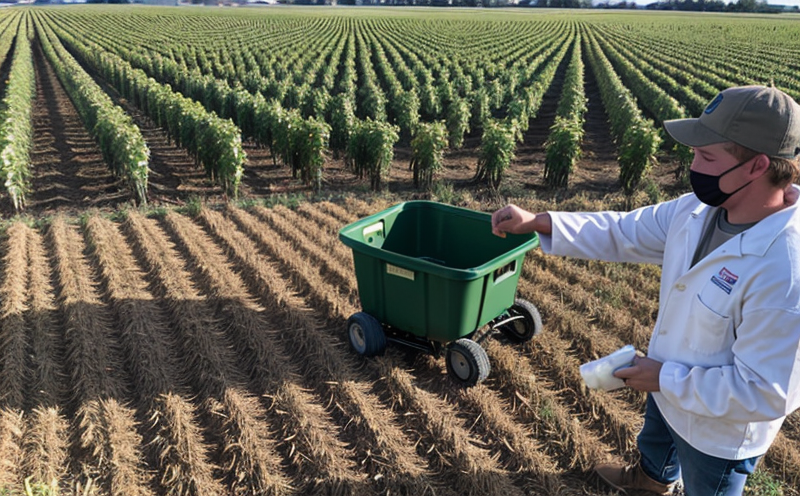Fungal Contamination Testing in Stored Crops
In agriculture and forestry testing, the quality of stored crops is a critical factor influencing market value, consumer safety, and overall supply chain efficiency. Fungal contamination poses significant risks to both crop quality and human health. This service focuses on detecting fungal contaminants that can arise during post-harvest storage and transportation.
Fungi such as Aspergillus, Penicillium, or Fusarium are common culprits of spoilage in stored crops like grains, fruits, and vegetables. These fungi not only degrade the texture and flavor but also produce mycotoxins that can be harmful when consumed. Mycotoxin contamination is particularly dangerous as it may go undetected until after processing.
Our testing ensures that harvested crops are safe for storage, transport, and ultimately consumption. This process involves a series of rigorous steps designed to identify and quantify fungal contaminants accurately. The first step is the collection of representative samples from various parts of the stored crop. Once collected, these samples undergo detailed laboratory analysis using advanced techniques like PCR (Polymerase Chain Reaction), HPLC (High-Performance Liquid Chromatography), or ELISA (Enzyme-Linked Immunosorbent Assay) to detect mycotoxins and fungal spores.
Understanding the specific challenges of stored crops, we also offer custom storage conditions simulation within our laboratories. This helps in predicting how different environmental factors such as temperature, humidity, and oxygen levels might affect fungi growth. Our services are not only about detection but also about providing actionable insights to improve crop handling practices.
The importance of accurate fungal contamination testing cannot be overstated. It ensures that the food safety standards set by international bodies like ISO, EN, or ASTM are met. This service is particularly important for compliance officers and quality managers who need reliable data to make informed decisions about storage and processing methods. For R&D engineers, this service provides a critical tool in developing new preservation techniques.
Our approach ensures that the final product reaches consumers in its best possible state without any health risks. This is achieved by providing precise quantification of fungal contaminants and their associated mycotoxins. The data generated from these tests can help in tailoring storage conditions to minimize fungal growth, thus preserving crop quality.
Furthermore, our testing method ensures that the storage environment does not inadvertently create a breeding ground for harmful fungi. By identifying and addressing potential issues early on, we contribute significantly to the overall safety and efficiency of the supply chain.
Why It Matters
Fungal contamination in stored crops poses serious risks to both producers and consumers. For producers, it results in economic losses due to reduced quality and shelf life of the crop. For consumers, it can lead to health issues ranging from mild allergic reactions to severe poisoning by mycotoxins.
The presence of fungi like Aspergillus flavus or Penicillium roqueforti not only affects the aesthetic appeal but also the nutritional value of the crops. Mycotoxins produced by these fungi can accumulate in the grain, fruits, and vegetables, leading to potential health hazards if consumed.
From a regulatory standpoint, compliance with international standards such as ISO 21786 or EN 12399-4 is crucial. These standards provide guidelines for the detection of mycotoxins in foodstuffs and feed materials. Our testing service ensures that crops meet these stringent quality and safety benchmarks.
In addition to ensuring compliance, our testing also helps in optimizing storage conditions. By understanding how different environmental factors impact fungal growth, producers can implement more effective preservation strategies. This not only enhances the overall quality of the crop but also extends its shelf life, thereby increasing marketability and profitability.
The economic implications are significant. A single contaminated batch could result in substantial financial losses for a producer or supplier. By preventing such occurrences through thorough testing, we help safeguard the entire supply chain from potential pitfalls.
Consumer health is paramount, and our service plays a vital role in ensuring that the products reaching consumers are safe to eat. This contributes to building trust between producers, suppliers, and consumers, ultimately fostering a more reliable food system.
Scope and Methodology
| Parameter | Description |
|---|---|
| Sample Collection | Representative samples are collected from various parts of the stored crops to ensure accuracy. |
| Preparation and Storage | Samples are prepared according to standard protocols before undergoing analysis. |
| Analytical Techniques | Advanced methods like PCR, HPLC, or ELISA are employed for precise detection of mycotoxins and fungi. |
| Data Analysis | Results from the analyses are carefully evaluated to determine levels of fungal contamination. |
Eurolab Advantages
At Eurolab, we pride ourselves on offering comprehensive and reliable services tailored specifically for the needs of agriculture and forestry testing. Our expertise is rooted in decades of experience and state-of-the-art laboratory facilities equipped with cutting-edge instruments.
We have a team of highly skilled scientists and technicians who are dedicated to providing accurate and timely results. This commitment ensures that our clients receive actionable insights that can be implemented immediately into their operations.
Our services go beyond just detection; we also offer recommendations for improving storage conditions based on the data obtained from these tests. Our continuous research and development efforts ensure that we are at the forefront of innovation in this field.
We understand the importance of confidentiality and adhere strictly to ethical standards in all our operations. This ensures that our clients can trust us with their sensitive information without any concerns about privacy or data integrity.
Our global network allows us to provide services across different regions, making it easier for clients to access our expertise wherever they are located. Whether you're a local farmer or an international corporation, Eurolab is here to support your quality assurance needs effectively.





